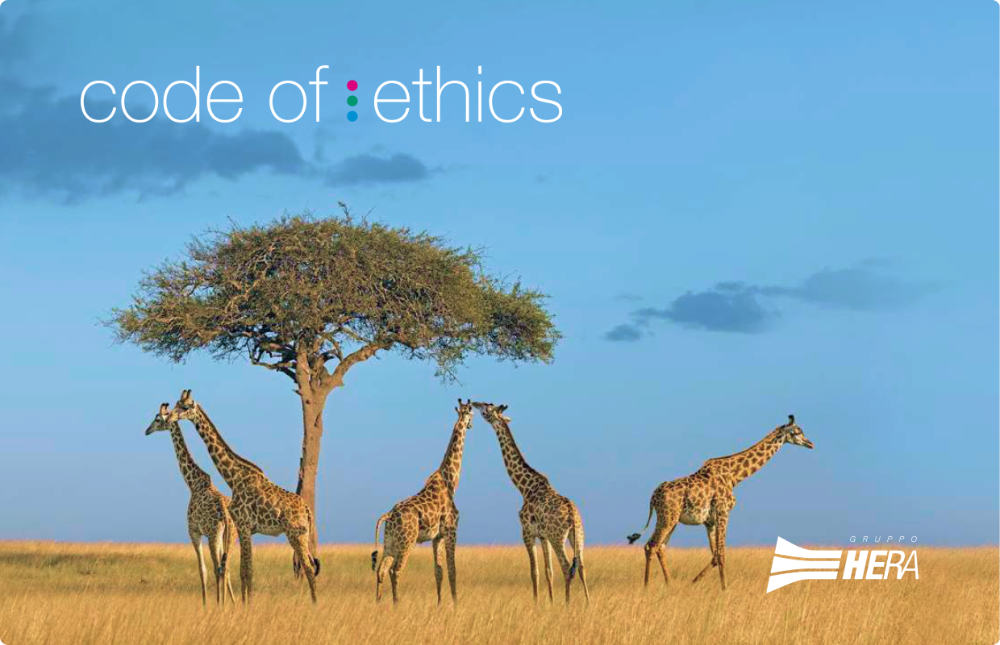Code of ethics
Code of ethics
- Group
- Sustainability
- Social Responsibility
- Code of ethics
The Code of ethics: our reference point
Our company purpose is embodied in the Code of ethics, which is a reference point for us and all the people we work with. The Code of Ethics contains the goals we strive for and was adopted by all our subsidiaries in 2007.
What is a Code of ethics?

A Code of ethics is one of the instruments of a company’s corporate responsibility. It is instrumental in implementing practices of good conduct, a reference point, and a guide for all those who work at Hera and those who have stakes in its achieving its purpose and mission.
It expresses the commitments and responsibilities Hera employees assume in executing all company activities.
It aims to direct individual behaviour and the management of activities according to the purpose, the mission, the ethical values and operating principles defined to build a positive corporate reputation through unequivocal behaviour and the satisfaction of stakeholder needs.
As per Article 8 "Validity of the Code", a Code of ethics is valid for three years, after which it must be reviewed and revised if necessary. After the first review in 2010, the second update was carried out in 2013, the third in 2016, the fourth in 2019 and the fifth in 2022.
A fair environmental and digital transition, the personal and professional well-being of the people working at Hera, the care for our most vulnerable customers and the importance of dialogue and listening are also some of the elements that characterise the latest update of the Code, which saw the involvement of all the Hera Group's workers.
Our goal
The goal of our Code of ethics is to foster virtuous behaviour for the benefit of Hera people, customers, suppliers, investors, communities and the environment and to strengthen our reputation.
As required by the Qualification System, since 2006 we have shared our Code of ethics with all our suppliers: in fact, the contracts drafted by the Group' companies include termination clauses in the event of failure to comply with its principles.
Code of Conduct – Supplier Sustainability Agreement
The contents of the Code of Ethics constitute the foundations of the "Code of Conduct – Supplier Sustainability Agreement".
By way of a true sustainability pact, Hera asks its suppliers to share the same ethical references, in order to reach a correspondence between Hera’s commitments and those taken on by its suppliers, from the shared perspective of creating shared value and protecting the environment and people.
Discover the Code of Conduct – Supplier Sustainability Agreement
Ethics and Sustainability Committee
The Ethics and Sustainability Committee has the task of monitoring the dissemination and implementation of the Code of Ethics and of exercising the functions of supervising the sustainability aspects associated with the exercise of the company's business. In particular: receives reports of violations of the Code and evaluates whether or not a proceeding can be opened, monitors the implementation of sustainability policies, formulates, at the request of the Board of Directors, an opinion on specific sustainability issues, examines the corporate procedures on social and environmental matters, and examines in advance the sustainability report to be submitted to the Board of Directors.
Who is it composed of?
The Committee is made up of 4 members, including at least one independent director of Hera Spa, the Director of the Shared Value and Sustainability Department and at least one external member who is an expert on social responsibility and sustainability.
In the meeting of the Board of Directors of Hera S.p.A. of 10 May 2023, the members of the Ethics and Sustainability Committee were appointed:
- Alice Vatta, Director of Hera S.p.A. with the functions of President
- Francesco Perrini, Director of Hera S.p.A.
- Filippo Maria Bocchi, Head of the Shared Value and Sustainability Department of Hera S.p.A.
- Nicoletta Tranquillo, expert in corporate social responsibility (external member)
who will remain in office until the date of approval of the Financial Statements for the year 2025.
Reporting to the Ethics and Sustainability Committee
| N. | 2021 | 2022 | 2023 | 2024 |
|---|---|---|---|---|
| Workers | 3 | 5 | 7 | 4 |
| Customers | 3 | 2 | 5 | 2 |
| Suppliers | 1 | 1 | 0 | 0 |
| Other stakeholder | 0 | 1 | 2 | 0 |
| Total | 7 | 9 | 14 | 6 |
In 2024, the Ethics and Sustainability Committee received six reports: four from employees and two from customers. The issues reported by employees were: management of working time, diligence and efficiency in the use of company resources, attention to environmental resources, attention to the private sphere and relations between colleagues. The issues reported by customers, on the other hand, concerned: information and communication, quality, service continuity and safety. The Committee found no breaches of the principles of the Code of Ethics, including those in the Standard & Poor’s questionnaire for the Dow Jones Sustainability Index: corruption, discrimination and harassment, customer privacy, conflict of interest, money laundering and insider trading. The Committee promoted good practices within the Company, facilitated dialogue between the whistleblower and the Company, and suggested possible improvements to activities and processes.
In addition, it is specified that reports are handled by protecting the confidentiality of the identity of the whistleblower, who must be informed that information and testimonies given may, with consent, not remain confidential for the purposes of carrying out investigations. In accordance with the shared work plan, during 2024, the Committee reviewed:
- the draft sustainability report;
- the main contents in advance of the Board of Directors.
Furthermore, it shared and deepened
- the updates on the Corporate sustainability reporting directive (CSRD) project;
- the updates on the Net Zero project;
- the results related to Hera’s inclusion in the Dow Jones Sustainability Indices;
- sustainability training activities, including those related to the dissemination of the Code of Ethics;
- the management of Hera Comm’s partner sales agencies.
In addition, as every year, the annual meeting with the Supervisory Board was held to discuss common issues for effective and mutual cooperation. Finally, it must be noted that, at its first meeting in 2025, the Committee shared the repercussions on reporting of the double materiality analysis and the main contents of this Sustainability Statement.
How to make a report
The Ethics and Sustainability Committee is the Group's channel responsible for collecting any reports regarding possible conduct that does not comply with the Code of Ethics.
Reporting to the Ethics and Sustainability Committee: how to make a report
The Whistleblowing reporting portal is the Group's channel responsible for collecting any suspected violation of the Model for the prevention of corruption, alleged crime, fraud, corruption or other offence of a relevant nature.
The Whistleblowing reporting portal is the Group's channel responsible for collecting any suspected violation of the Model for the prevention of corruption, alleged crime, fraud, corruption or other offence, whether or not relevant for the purposes of liability pursuant to Legislative Decree 231/2001 or any other information useful for the purpose of preventing crimes.
Reporting to the Whistleblowing Reporting Portal: how to make a report



